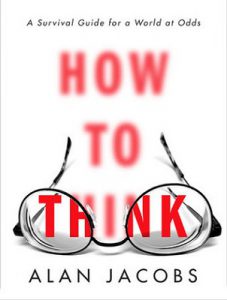The Simplicity Assumption
By Arnold Kling

This attitude… is based on the belief that “the difficulties and disorders of humankind can be overcome by some large-scale adjustment: it suffices to devise a new arrangement, a new system, and people will be released from their temporary prison into a realm of success.”
—Alan Jacobs, How to Think: A Survival Guide for a World at Odds1

A few days after Hurricane Maria struck Puerto Rico on September 20, 2017, one of my acquaintances assured me that helicopters were the solution to the humanitarian crisis that ensued. Although he was no logistics expert, it seemed clear to him that helicopters could have brought needed supplies to the suffering people.
Later, I looked up the population of Puerto Rico, and I found an estimate of over three million people. I considered this number relative to my impression of the carrying capacity of a helicopter. I concluded that perhaps the problem of providing humanitarian relief was a bit more complicated than my acquaintance was suggesting.
Regardless, suppose that you put yourself in the frame of mind of someone like my acquaintance, who believed that the logistical problem of delivering relief is simple, and that helicopters are the obvious solution. It follows that the failure to solve the logistical problem must be due to some combination of incompetence and bad intentions. Indeed, my acquaintance arrived at this very conclusion. He confidently proclaimed that the Federal Emergency Management Agency (FEMA) was inept, and furthermore that President Trump did not care about the suffering of Puerto Ricans.
The Niskanen Center’s Jeffrey Friedman points out the dangers of
… the assumption that modern society is so simple that the solutions to its problems are self-evident.
If this assumption holds, then the failure to solve social and economic problems can’t be blamed on policymakers’ ignorance of how to solve them: self-evident knowledge is, by definition, available to everyone. Instead, failure must be blamed on policymakers’ unwillingness to do what they self-evidently should do. Thus, citizens who assume that the solutions are self-evident are likely to use motivational explanations for government failure rather than epistemological explanations. Motivational explanations invite us to continue having faith that the government will “solve all our problems”—so long as leaders with the right motivations are put in charge.2
Let us use the term “Simplicity Assumption” to refer to the tacit or explicit belief that social problems have easily recognized causes with obvious solutions. In the words of David Peter Stroh, the person who engages in what Stroh calls conventional thinking believes that “The connection between problems and their causes is obvious and easy to make.”3
As was the case with my acquaintance, the Simplicity Assumption may entail the belief that the individual making the assumption knows the solution. An alternative variation, which we might call Simplicity Assumption(a) is the belief that “Although I don’t know the answer myself, I am sure that there are experts who do.” This gives rise to a demand for highly confident experts, and the supply tends to arise to meet this demand.
There are many examples of claims that reflect the Simplicity Assumption:
- the claim that the solution to immigration enforcement is to “build the wall”
- the claim that the solution to health care cost and availability is to adopt a “single payer” plan
- the claim that the solution to financial instability is to bring back Glass-Steagall
- the claim that the friction between police and black males is due to the War on Drugs
The Simplicity Assumption afflicts citizens of all political persuasions. I believe that it also afflicts economists, who take pride in what they regard as the power of simple models. Some prominent health economists have made the claim that “It’s the prices, stupid,” implying that reducing the cost of health care is merely a matter of negotiating more aggressively with health care providers.4 Others have claimed that government technocrats have the ability to devise compensation systems that will induce health care providers to improve the quality of their services.5
The opposite of the Simplicity Assumption would be a complexity diagram. Imagine a diagram with a social problem, such as the obesity epidemic or the financial crisis of 2008, at the center. Then list all of the plausible factors that could have contributed to this problem, and put those on the diagram, with arrows pointing to the central problem. Next, draw arrows that reflect likely feedback loops among these various causal factors. Finally, draw arrows that reflect likely feedback loops from the central problem to some of these causal factors. For a complex problem, this diagram will look rather messy, like a badly tangled ball of kite string; you cannot be sure that tugging on one part of the knotted mess will make things better or worse.
Economists do not work with complexity diagrams. Such diagrams are not conducive to creating tractable models. Not having a tractable model is not conducive to publishing a paper. Not publishing papers is not conducive to having a successful career.
As Jeffrey Friedman points out, the insidious effect of the Simplicity Assumption is that it leads one to impugn the motives of those with whom we disagree. Anyone who rejects what we regard as obvious solutions to simple problems must be willing to countenance continued harm and suffering. This feeds into political polarization.
The problem of political polarization is itself multi-faceted and complex. As Alan Jacobs and others point out, trends toward separation by social class have reduced interactions among Americans, leading us to tend to see other groups as what Jacobs calls the “Repugnant Cultural Other.”
“Our urge to respond quickly means that we put more emotion and less thought into our reactions.”
Fast-paced social media contributes to polarization. Jacobs points out that conversations that used to be private are now public, and our more careless and thoughtless comments reach a wider audience. Our urge to respond quickly means that we put more emotion and less thought into our reactions.
Even though polarization has many roots in social psychology, class structure, and so on, I believe that the Simplicity Assumption is a central element. It would help if we could recognize when we are making the assumption and if we could develop strategies for backing away from it.
For more on these topics, see the EconTalk podcast episodes Megan McArdle on Internet Shaming and Online Mobs; Cass Sunstein on #Republic; and Arnold Kling on the Three Languages of Politics.
Jacobs emphasizes the social aspects of thinking. We do not arrive at beliefs on our own. The people who we encounter influence us. He points out that we are more likely to think deliberatively if we seek to absorb ideas from, and discuss issues with, open-minded, careful thinkers.
Jacobs may have the best suggestion for what we as individuals can do to try to contribute to solving the problem of political anger and polarization. That is, we should seek to interact with and raise the status of individuals who do not operate, either tacitly or explicitly, based on the Simplicity Assumption.
Alan Jacobs, 2017, How to Think: A Survival Guide for a World at Odds. Jacobs here is citing Roger Scruton’s The Uses of Pessimism.
Jeffrey Friedman, “The Legitimacy Crisis”. Niskanen Center Blog, Oct. 4, 2017.
David Peter Stroh, Systems Thinking for Social Change, cited in Seth D. Kaplan, “A Systems Approach to Social Disintegration”, National Affairs no. 33, Fall 2017.
Gerard F. Anderson, Uwe E. Reinhardt, Peter S. Hussey and Varduhi Petrosyan 2003, “It’s The Prices, Stupid: Why The United States Is So Different From Other Countries,”Health Affairs, vol. 22, no. 3, May/June 2003.
David Cutler, 2014, The Quality Cure: How Focusing on Health Care Quality Can Save Your Life and Lower Spending Too.
*Arnold Kling has a Ph.D. in economics from the Massachusetts Institute of Technology. He is the author of several books, including Crisis of Abundance: Rethinking How We Pay for Health Care; Invisible Wealth: The Hidden Story of How Markets Work; Unchecked and Unbalanced: How the Discrepancy Between Knowledge and Power Caused the Financial Crisis and Threatens Democracy; and Specialization and Trade: A Re-introduction to Economics. He contributed to EconLog from January 2003 through August 2012.
For more articles by Arnold Kling, see the Archive.
